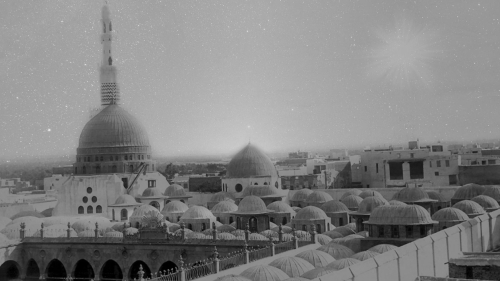The Islamic Notion of Mercy

Acquaintances of mine who have participated in recent dialogues between Christian and Muslim theologians, such as those organized by A Common Word, report that one of the biggest misunderstandings shown by Christian theologians is the notion that Islam has little or nothing to say about love.
One of the several reasons for this mistaken view is that the early Orientalists -- those who first studied Islamic thought in the modern West -- imagined that a school of thought known as "Kalam" played the same role in Islam as "theology" does in Christianity. In fact, Kalam has been one of several approaches to knowledge of God, and certainly not the most influential.
Kalam was closely allied with Islamic jurisprudence and typically depicted God as the supreme law-giver. When it mentioned love, it claimed that God loves human beings by issuing commandments, and human beings love God by obeying him. Those who obey go to heaven, and those who disobey go to hell. God deals with human beings strictly in terms of carrots and sticks -- forget about love in any normal meaning of the word.
Despite the fact that more recent scholarship has done a much better job of describing the diverse theological approaches of Islamic thought, this has had relatively little effect on the prejudices that Christian theologians picked up years ago in seminary. Pope John Paul II, with all his remarkable accomplishments, provides a good example. In Crossing the Threshold of Hope, he wrote, "The God of the Koran ... is ultimately a God outside of the world, a God who is only Majesty, never Emmanuel, God-with-us." (his emphasis)
Even a cursory glance at the Quran should lead a reader to wonder why, if God is so majestic, does practically every chapter begin with the formula of consecration: "In the name of God, the All-merciful, the Ever-merciful." In the text itself, divine names and attributes associated with mercy and kindness are far more common than those associated with magnificence and majesty. Many verses say things like, "He is with you wherever you are" (57:4) -- whether before your creation, during your brief stay in this world, or after death. This divine "witness" is tightly bound up with the notion of love and mercy.
The formula of consecration contains the two names "All-merciful" (rahmān) and "Ever-merciful" (rahīm). Both are derived from the word rahma, which is variously translated as mercy, compassion, and benevolence. Rahma is an abstract noun derived from the concrete noun rahim, "womb." Mercy is the mother's attitude toward the fruit of her womb. When God says in the Quran, "My mercy embraces everything" (7:156), this means that God has mercy on the entire universe. Basing themselves on this sort of verse and on the very notion of mercy, some theologians referred to the realm of nature -- that is, the universe in its entirety -- as the divine womb.
The close connection between mercy and motherhood is obvious in many sayings of the Prophet. For example, he said that when God created mercy, he created it in one hundred parts. He kept ninety-nine parts with himself and sent one part into the world. Mothers are devoted to their children and wild animals nurture their young because of this one part. On the day of resurrection, the Prophet added, God will rejoin this one part with the ninety-nine parts -- all for the benefit of those who dwell in the posthumous realms, whether paradise or hell. Among the several points embedded in this saying is the typical stress on tawhīd, the assertion of the uniqueness of the divine reality that is the foundation of Islamic thought: What we experience as mercy, compassion, and love can only be a pale reflection of a tiny fraction of the real thing.
Another account tells us that the Prophet had stopped to rest at a bedouin camp, where a woman with an infant was baking bread over an open fire. The child slipped away and approached the fire, and the mother quickly pulled him back. She turned to the Prophet and said, "Do you not say that God is 'the most merciful of the merciful'?" He replied that he did. She said, "No mother would throw her child into the fire." For a moment the Prophet turned away and wept. Then he said that God puts into hellfire only those who refuse to go anywhere else.
As a divine attribute, mercy is not identical with love, because love demands mutuality: "He loves them, and they love Him" (5:54). In contrast, mercy is one-sided, which is to say that God has mercy on creation, but not the other way around. People must certainly try to be merciful and compassionate, but that means they must love their neighbors as themselves. Failure to do so is a sure recipe for bad karma. As the Quran says repeatedly about those who do not act appropriately, "They are wronging only themselves."
Classical theologians spent a good deal of time explaining the subtle differences between the meanings of "All-merciful" and "Ever-merciful." Commonly they said that the All-merciful mercy is universal and the Ever-merciful mercy is particular.
Universal mercy begins with the bestowal of existence. Nothing has a claim on its own being or its own positive qualities. All are the gifts from the Creator. Everything other than God derives its reality -- however insubstantial that may be -- from the only reality that truly is. Life and livelihood do not come to us by chance, but because of the activity of the All-merciful.
Particular mercy is responsive. Some good things come to us because we seek them out. If you want to become a football player or a physicist, the ambition itself is a gift, and any aptitude you may have is also a gift. But achieving the goal has something to do with your own effort. Every mother will tell you that. If you do not strive for the goal, most likely you will not reach it.
God's particular mercy is his response to human effort. He bestows it on the basis of your engagement, commitment and love. When the Quran says, "God is the friend of those who have faith" (2:257), this means that he has special mercy and love toward those who search him out. Universal mercy reaches people in any case, just as a mother will never stop loving her children. Particular mercy is not guaranteed, because children may refuse to take advantage of their human status.
The goal of love is to overcome separation, to escape from the darkness and pain that define our existential plight, and to enter into the light. Or, it is to take advantage of the universal mercy that embraces everything and to seek out the particular mercy, the path to which is set down in prophetic guidance.
Source: The Huffington Post - William C. Chittick, Ph.D.Professor of Religious Studies, State University of New York, Stony Brook
Views: 6728
Related Suggestions

















